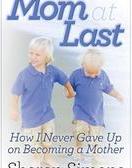By Linda Carroll
Jill and Tom Clinton knew they wanted to have kids after they got married in 2006 – and they weren’t getting any younger. So, after a miscarriage, the couple turned to a fertility clinic.
The Clintons’ health insurance policy didn’t cover in vitro fertilization, which averages more than $12,000 per cycle. Nevertheless, the couple dug into their savings to pay for enough IVF cycles to conceive a son they named Harrison.
“We were thrilled,” Jill told Dr. Nancy Snyderman, NBC’s chief medical editor.
But the couple knew they wanted a bigger family – and they weren’t sure how many cycles it would take to conceive a little brother or sister for Harrison.
Visit msnbc.com for breaking news, world news, and news about the economy
“We knew that we wanted to have more kids, although we had limited funds and we weren’t sure how many tries we could get,” Jill told TODAY.
At that point, their doctor at Maryland’s Shady Grove Fertility Clinic told the couple about a new trend in lending: fertility financing.
Dozens of fertility finance companies are popping up around the country with a wide variation in interest rates. And while many couples are happy with the new option, some experts are concerned that loan companies like these might be taking advantage of a vulnerable group of patients.
The company the Clintons chose, Capex MD, was started by banker Jules Segal.
“At present we’re funding about a million dollars of loans a month,” Segal told Snyderman. “We’re on a very steep growth curve and we’re looking to fund about $15 million in loans in 2012.”
Segal makes sure his employees are familiar with fertility treatments, with many having gone through the process themselves. That made a big difference to the Clintons.
“They understood the language, the terms that I used that were associated with fertility and I took comfort in that,” Jill said. “We didn’t have to look any further and that filled the gap and allowed us to do the final cycle.”
That final cycle gave the Clintons the results they wanted: twins, Piper and Hudson.
“We’ve got plenty of results,” Jill said with a laugh. “We’re finished with results!”
Even with success stories like the Clintons’, some experts are concerned that desperate couples could get into financial trouble – and that doctors who own a share of the loan companies might be crossing ethical boundaries.
“When someone comes and says I can make this possible for you and I can make the financing possible, you really have to be a little bit careful because you’ve got vulnerable, desperate people who want to hear that there’s an answer to their prayers,” said Arthur Caplan, the head of the division of medical ethics at NYU’s Langone Medical Center. “I’m worried they’re not going to hear the failure and success rate, the interest rate, and what the risks are of the treatments.”
Snyderman advises patients to be careful when choosing a finance company.
“I think you have to channel your inner Suze Orman,” she told TODAY’s Savannah Guthrie. “You really have to read the details. If it’s a 22 percent fianance charge – you wouldn’t do that in any other loan.
“Some people think this is a little predatory. You have people that are emotional. They want something and they may not be thinking clearly enough. …Take someone with you who will read this counsel you and be your pit bull as you go through this.”
Read the full article associated with the video by clicking here

